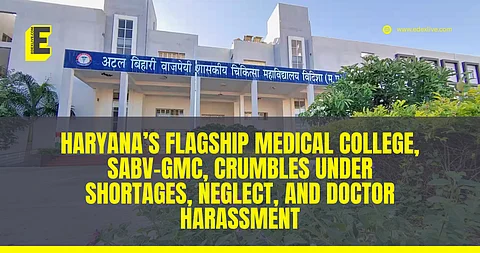

The grand vision of “establishing medical colleges in every district” represents one of the most ambitious healthcare expansion programs in Haryana. This initiative found its embodiment in the Shri Atal Bihari Vajpayee Government Medical College (SABV) - GMC) in Faridabad, inaugurated in 2022 amid fanfare and political promises of transforming healthcare accessibility across the state.
Yet behind the ceremonial ribbons and inaugural speeches lies a starker reality that questions the very foundation of the program and its emphasis on quantity over quality.
What emerges from the corridors of SABV-GMC is an alleged pattern of administrative oversight and systemic breakdown that compromises patient care and hinders doctors’ ability to function effectively. Junior residents are left without supervision, and they claim that patients receive substandard care due to the absence of essential equipment and medicines, and the institution resembles a political symbol more than a functioning medical college.
The crisis also encompasses alleged financial exploitation through denied Dearness Allowances (DA), institutional harassment of protesting doctors, and violations of basic medical education standards established by regulatory bodies.
The situation reached a critical juncture, where the United Doctors Front (UDF), led by Dr Amit Vyas, moved to file formal complaints with state authorities and made preparations for legal intervention.
Dr Vyas, State President of the UDF, paints a devastating picture of institutional failure at what should be a premier medical facility.
“This college lacks even the most basic medical essentials. Common medications like Duolin and Foracort for nebulisation are unavailable. In the casualty, there aren’t enough monitors, and the emergency response system is severely inadequate. There are no functional wards in any department, and the operation theatre is non-operational. Critically, there are no senior residents or professors in key departments,” he claims, describing conditions that would be unacceptable in any healthcare setting.
He attributes these failures to a deeper policy flaw. “When a government medical college is announced, the focus is often on publicity and grand ceremonies, while planning for infrastructure, equipment, faculty, and administrative systems is neglected,” he notes.
Junior resident Dr Adarsh Tripathi puts a human face to the systematic failure. Posted in the Department of Medicine, he found himself working without senior supervision. “Even basic items like IV fluids were missing. I had to buy asthma medication from my own pocket because the hospital couldn’t provide it,” he claims.
He also highlights serious lapses in diagnostic services. “Lab delays are common. Even when I mark tests urgent, results are delayed or misplaced. Patients are often told to return, only to learn their reports are unavailable.”
Efforts to raise these issues internally met resistance. “We’ve not been paid DA since joining. Despite multiple peaceful representations to the Director, nothing changed. We eventually declared our intent to strike,” he alleges.
Following this, Dr Tripathi was allegedly harassed during a “surprise inspection” by senior faculty member Dr Shweta Sinha, who questioned his background and issued a show cause notice. “This is institutional harassment. I’m being targeted for raising legitimate concerns. If needed, I will approach the Punjab High Court,” he says.
Beyond supplies and staffing, basic hygiene and safety are also missing. “At one point, we waited months for hand sanitiser. How are we expected to deliver quality care under such conditions?” Dr Tripathi asks.
In response to these persistent challenges, the UDF has approached the National Medical Commission (NMC) with formal complaints, citing violations of medical education standards at SABV-GMC. Simultaneously, Dr Tripathi has filed a Right to Information (RTI) application seeking clarity on infrastructure audits, faculty appointments, fund allocations, and pending Dearness Allowance (DA) disbursements. These efforts aim to document systemic failures through formal channels and bring transparency.
The crisis at SABV-GMC embodies a fundamental contradiction in Indian healthcare policy between ambitious expansion announcements and the sustained commitment required to create functional medical institutions.
The struggle of doctors at SABV-GMC is a test of whether India’s healthcare system can move beyond political theatre and build institutions worthy of the people they are meant to serve.
